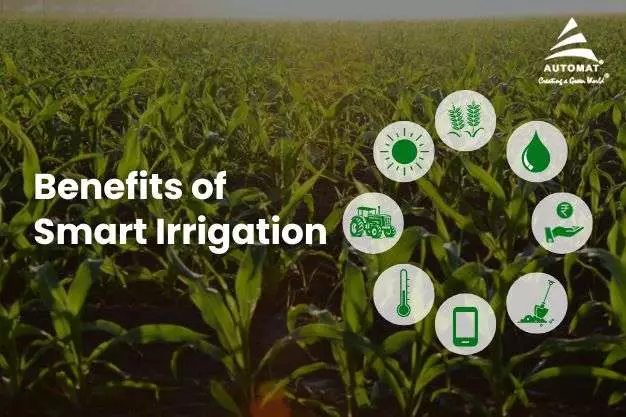
Introduction
Smart irrigation is an advanced irrigation system that utilizes technology and data to optimize water usage to improve plant health. It incorporates sensors, weather data, and automation to precisely deliver water, based on the need of the plant and environmental conditions. By preventing overwatering and conserving water resources, smart irrigation promotes sustainability and cost savings. It offers remote control and monitoring capabilities, allowing users to manage their irrigation systems precisely and conveniently. With customization options and integration with weather data, smart irrigation ensures efficient watering for optimal plant growth and reduced environmental impact.
Intelligent irrigation systems have many advantages over traditional irrigation methods. The main benefits of smart irrigation are:
1. Water Conservation
Smart irrigation systems use advanced technologies such as soil moisture sensors, weather data and evapro–transpiration modelling to determine the exact watering needs of plants. This prevents over-watering and ensures plants get the right amount of water, leading to significant water savings.
Read more: Automatic Irrigation Systems – New technology awareness and its benefits to farmers
2. Cost savings
Smart irrigation systems help reduce water and electricity bills by optimizing water usage. Water is a precious resource, so minimizing waste means lower costs for homeowners, businesses and farms. In countries with higher peak hour tariffs, smart irrigation systems can be programmed to take benefit of the low tariff periods ensuring substantial cost benefits to the user.
3. Improved plant health
Intelligent irrigation systems allow plants to receive water according to their specific needs. This ensures that the plants have adequate moisture, promotes healthier growth, and reduces the risk of under or over-watering which can lead to plant stress, disease, and reduced yields.
4. Increases work efficiency
The intelligent irrigation system automates the watering process, eliminating the need for manual monitoring and adjustments. Once the system is set up, it can operate independently, saving farmers time and effort. Farmers are not bound to the field but can utilise their time for other productive works.
Read more: Drip Irrigation System
5. Environmental compatibility
Intelligent irrigation systems contribute to environmental compatibility by reducing water use which can help reduce pressure on local water sources which is critical for areas prone to drought and water scarcity.
6. Remote control and monitoring
Many smart irrigation systems offer remote control and monitoring capabilities via mobile apps or web interfaces. It allows users to manage their irrigation systems, adjust watering schedules, manage maintenance schedules of components e.g filters, monitor soil moisture levels, and receive alerts and notifications from the system incase of any deviations or breakdowns.
7. Integration with weather data
Smart irrigation systems can integrate real-time weather data and adjust irrigation schedules based on rainfall, humidity, temperature and other environmental factors. This ensures that irrigation is adapted to weather conditions, optimizes water use and avoids unnecessary watering in wet weather.
8. Customization and Flexibility
The intelligent irrigation system offers a high degree of customization. Users can customize watering schedules for e,g watering of farms, lawns and gardens can be automatically scheduled for night so as to prevent excessive evaporation of moisture and also not to clash with peak domestic use period. It can set specific moisture thresholds, and configure zone-specific settings for different plant types and soil conditions. This flexibility allows for precise irrigation management tailored to the specific needs of different regions and crops.
Overall, smart irrigation systems offer an efficient, sustainable, and practical solution for managing water resources while promoting healthy plant growth.




